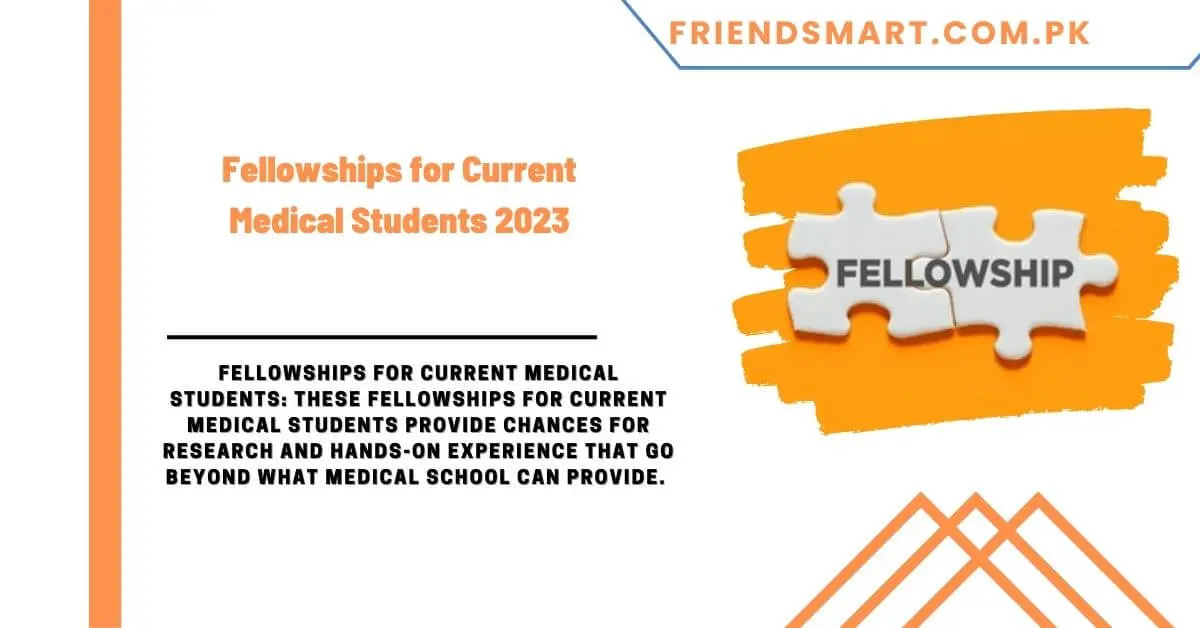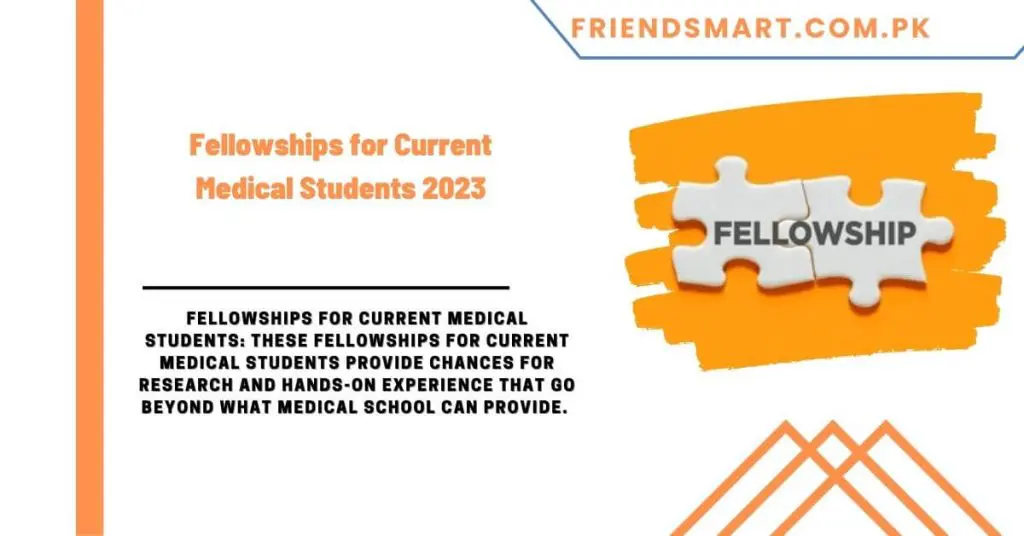Fellowships for Current Medical Students 2023

Fellowships for Current Medical Students: These fellowships for current medical students provide chances for research and hands-on experience that go beyond what medical school can provide. Advocacy training, global health research, summer research, and unique rotations are all available. International opportunities are also available. If any of these sound like a good fit for you, save it to your ProFellow account!
AMA Government Relations Advocacy Fellowship
The AMA Government Relations Advocacy Fellowship (GRAF) provides medical students with a once-in-a-lifetime opportunity to gain direct experience with the interaction between organized medicine and the federal government in terms of advocacy and policy-making. Each spring, one Fellow is chosen to work as a full-time, paid member of the AMA’s federal advocacy team in Washington, D.C. for a year.
AMSA Fellowship Program
The Education & Advocacy Fellow (EAF) position is a one-of-a-kind opportunity for a physician-in-training student to spend a year supplementing their formal medical training by delving deeply into critical issues affecting access to affordable, high-quality healthcare, global health equity, diversity in the healthcare workforce, and medical professionalism. The fellowship aims to teach and improve the fellow’s skills in grassroots organizing, leadership development, strategic planning, and advocacy. The fellowship is for one year and offers a $50,000 stipend.

Endocrine Society Summer Research Fellowships
Summer Research Fellowships are available from the Endocrine Society to encourage promising undergraduate students, first-year medical students, and first- or second-year graduate students to pursue careers in endocrinology. Each scholarship recipient receives a stipend from the Society to participate in research initiatives for 8 to 10 weeks during the summer under the supervision of a Society member. Following the summer fellowship, grantees are invited to the ENDO Conference, the Society’s Annual Meeting & Expo, and will be provided with complimentary registration, airfare, and housing, as well as per diem for the duration of the meeting.
Read More: The Best Creative Writing MFA Programs 2023
Epidemiology Elective Program
Through hands-on experience and guidance from CDC subject matter experts, the Epidemiology Elective Program (EEP) introduces medical and veterinary students to applied epidemiology, public health, and global health. This program provides 6- or 8-week rotations mostly at CDC in Atlanta, Georgia. Fellows are currently enrolled in a medical or veterinary school in the United States and have completed two years of coursework. Every attempt is made to place students in assignments that give leadership experience and are related to their career objectives and desired public health topic areas. Participation in EEP is usually rewarded with course credit at most schools.
Fulbright-Fogarty Awards in Public Health
Fulbright-Fogarty fellowships, offered in collaboration with the National Institute of Health’s Fogarty International Center, provide medical students and graduate students interested in global health with the opportunity to conduct research in public health and clinical research in resource-limited settings. Fellows are assigned to one of nine countries in Sub-Saharan Africa, Asia, or South America for nine months. To be eligible, applicants must be US citizens, enrolled in graduate or medical school, and have sufficient fluency in the host language to complete the project. Applicants with a Ph.D. degree are ineligible.
RPB Medical Student Eye Research Fellowship
The Medical Student Fellowship (MSF) encourages talented medical students to pursue careers in eye research by providing them with a year off from school to work on a research project at an RPB-supported department of ophthalmology. Chairs supported by the RPB may nominate a medical student before the third or fourth year of medical school. Only MD students are eligible to apply; MD/Ph.D. students are not. The prize money is $30,000. Applications with no prior nomination will be rejected. Each year, there are two nomination deadlines.
Stanford-ABC News Global Health and Media Fellowship
This program is intended to provide medical students, residents, fellows, and/or professors with hands-on experience in global health reporting through a range of media outlets, including print, television, social networking, and journalism and communications principles. The Fellow will work at the World Health Organization’s South East Regional Office (SEARO) in New Delhi, India, after completing training programs via Stanford University’s Graduate Program in Journalism. The Fellow is compensated well. The Fellowship is a 12-month program that begins in June of each year.
The David E. Rogers Student Fellowship Award
This fellowship is intended to expand the educational experiences of medical and dental students by focusing on projects that benefit community health and address the human needs of underrepresented or disadvantaged patients or populations. Clinical research, public health/epidemiology, health policy analysis, and activities combining biomedicine, social infrastructure, and human or community needs could all be part of the Fellowship. A $4,000 grant is granted to support a 10- to 12-week project over the summer between the student’s first and second years of medical/dental school.
People Also Ask
-
What is the difference between a fellowship and a residency?
The residency program is usually longer than a year, whereas the fellowship program is usually two years or less. As a result, while fellowships are more formal and last longer than residencies, their goals and aims are essentially the same.
-
Is fellowship harder than residency?
A medical fellowship usually lasts between one and three years. Only after graduating from medical school and finishing a medical residency can one become a fellow. Fellowships are entirely optional and not needed. Medical fellowship years are thought to be even more labor-intensive than residency years.



